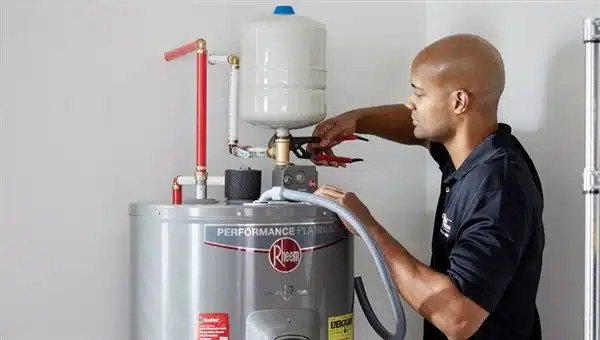Becoming a new homeowner comes with its fair share of challenges and uncertainties. One of those is your home’s plumbing system, which plays an integral part in providing you comfort and convenience. The water heater, for instance, is a crucial component you certainly don’t want to overlook. If you’re uncertain about the costs associated with a water heater install, this guide is for you. Let’s help ease your worries and guide you through understanding water heater installation costs.
Table of Contents
Understanding Water Heater Installation Costs
If the thought of water heater installation costs has you breaking out in a cold sweat, fear not. The cost spectrum can indeed be broad, ranging anywhere from $2,000 to a whopping $3,500. The typical homeowner, however, usually shells out around $2,750. There’s a reason for this considerable price range, which can make your head spin, but we’ll dissect it for you. In the grand scheme of things, these costs will make more sense once you understand the factors that come into play. So let’s jump in and make sense of these numbers!
Factors Affecting the Cost of Water Heater Installation
Embarking on the journey of water heater installation can feel like a rollercoaster ride when it comes to costs. Don’t worry, though; the ups and downs of this ride are navigable once you’re armed with the right knowledge. Let’s delve into the key elements that influence the final cost.
First and foremost, the type of water heater you choose – whether it’s a sleek, space-saving tankless model or a traditional tank-style unit – can be a game-changer in terms of price. Also, the size and capacity of the water heater can sway the cost, as larger units capable of providing hot water for multiple showers or appliances simultaneously will command a higher price.
Next, the energy efficiency of the unit also plays a pivotal role in determining the cost. Higher energy efficiency can mean a steeper upfront price but could save you a significant amount in the long run on your energy bills. The complexity of the installation is another crucial aspect. This involves factors like the accessibility of the installation site and whether any additional work, such as rerouting gas lines or installing new electrical circuits, is necessary.
Last but not least, local labor rates can significantly affect the overall cost of the installation. Additionally, should your existing setup require any modifications, these too can add a bit more to your bill. So, while the costs may initially seem overwhelming, knowing what factors come into play can help you better understand and navigate the process.

Ways to Save on Water Heater Installation
Don’t let the costs of water heater installation burn a hole in your pocket! There are numerous ways to curtail these expenses without compromising on quality or safety. Start by taking on simple tasks yourself. Perhaps you could handle the removal of the old unit, or even transport the new one home. Both tasks, although small, could save you some greenbacks.
Be on the lookout for discounts, special deals or rebates. Manufacturers often have promotions, and utility companies might offer incentives for choosing energy-efficient models. But remember, one of the best ways to save is to think long-term. An energy-efficient water heater might require a larger initial investment, but the substantial savings on your energy bills over time make it a financially savvy move.
Making the Right Decision for Your Home
At the end of the day, your water heater selection should be a balance of budget constraints, household needs, and energy efficiency aspirations. Delve deep into the pros and cons of different heater types and models, weighing not just the upfront costs, but the long-term expenses as well. A higher initial outlay on an energy-efficient model could save you substantial amounts in energy bills over time.
Prioritize a professional installation to ensure safety and efficiency, as a correct setup can prevent future complications and costly repairs. Remember, an investment in a quality water heater and its proper installation equates to a long-term investment in your home’s comfort, convenience, and cost-effectiveness. So take your time, do your research, and choose wisely. After all, your decision now will impact your home and wallet for years to come.
Importance of Professional Installation
While the idea of a DIY water heater installation might initially seem appealing due to potential cost savings, it’s essential to understand the potential pitfalls. The incorrect setup of a water heater could result in a series of serious and potentially hazardous complications. This includes dangerous carbon monoxide leaks, damaging water seepages, and even the invalidation of your manufacturer’s warranty.
By engaging the services of a professional plumber, you ensure the installation is done correctly and safely. These experts are knowledgeable about local regulations and manufacturer’s guidelines, ensuring your installation meets all the necessary criteria. Engaging a plumbing expert for the installation process isn’t merely a safeguard against future issues; it’s an investment in the safety and efficiency of your home. So, while the DIY route may appear cheaper on the surface, the peace of mind a professional installation offers is priceless.
FAQs
Why is the installation of a water heater such a costly endeavor?
Because water and electrical connections need to be made during the installation of a water heater, the process is time-consuming and expensive. The difficulty of guaranteeing a safe and efficient setup contributes to an increase in the overall cost of installing a water heater because of the complexity of the process. Additionally, the installation of certain heaters may necessitate the purchase of a permit.
How much does it typically cost to hire a plumber to install an electric water heater?
When upgrading from a tank-style water heater to a tankless unit, the installation labor expenses can reach up to $2,500. This is significantly higher than the average $150 to $500 range for labor costs associated with installing a standard replacement water heater.
How long does it take to set up a water heater that is 40 gallons in capacity?
An experienced technician would normally need between two and three hours to complete the installation of a hot water heater that holds 40 gallons.
Is a water heater with 40 gallons of capacity sufficient for a house that has three bedrooms?
Whether or whether a 40-gallon water heater is appropriate for a home relies on a variety of criteria, including the number of people living there, their habits regarding water consumption, and their way of life. In many instances, a unit with a capacity of forty gallons should be adequate for a home with three bedrooms.
